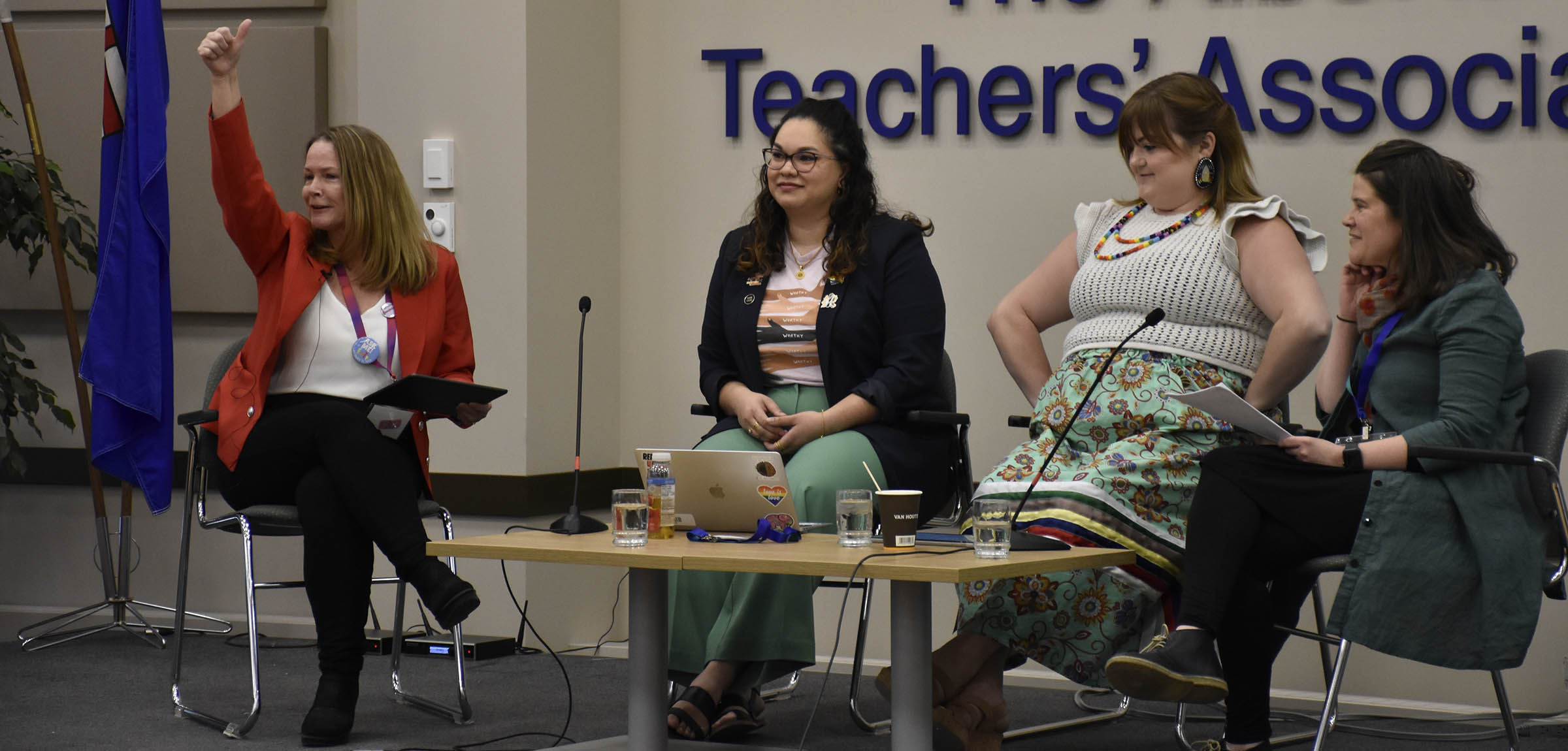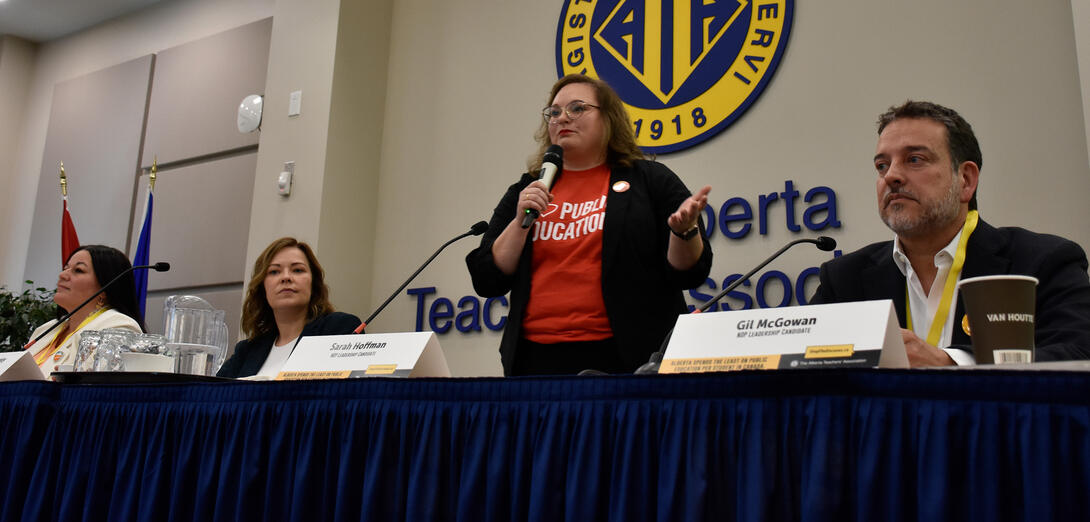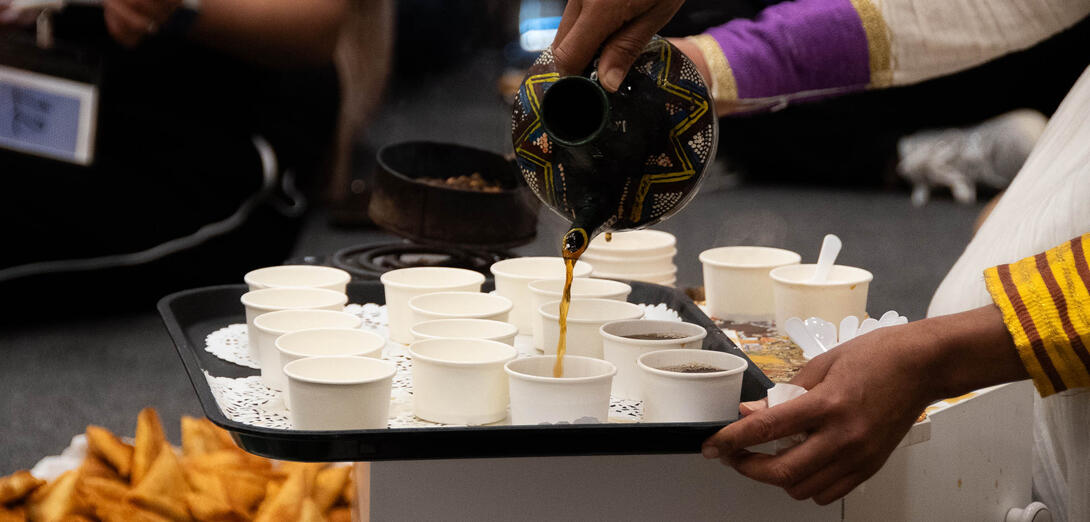Collaboration and connection, inclusion and empowerment — these were the overriding themes that emerged from a panel discussion with three DEHR committee members at the recent ATA DEHR conference on April 19.
Moderated by North West district representative Rhonda Kelly, the panel comprised teachers Stephanie MacPhail (Evergreen local no. 11), Keshini Senanayake (Calgary Public local no. 38), and Sarjenka Kuryliw (Greater St. Paul local no. 25).
Each answered five questions posed to them by Kelly that covered how they got involved with DEHR, what kinds of activities they organized, the ripple effect of DEHR work on their communities, the challenges they faced and what advice they could give others interested this work.
All three teachers felt that their main motivations for forming or joining a DEHR committee were a commitment to social justice causes, a desire to help students and teachers in need, and wanting to connect with others who shared their values and passions. Each has served on a committee for several years, and all have developed many initiatives and projects to address poverty, racism, and gender and sexual minority rights.
Senanayake summarized the work of DEHR committees across Alberta as attempting to address different forms of oppression systemically embedded in both the structures and policies of the education system.
“It will take a lifetime to address, disrupt and dismantle it, so anything we are doing, whether it’s a social media blast, a book club or creating [support] groups ... is good work that helps to move us forward,” she said.
She also reminded the audience of the benefits of sharing resources.
“There’s power in this room ... we should connect together and amplify each other’s work.”
Meeting local needs
When asked about the kinds of activities they had organized, each cited a variety of events and initiatives.
MacPhail’s committee, based mostly in Edson and Hinton, established a DEHR week, delivered Pride flags to each school in the division and to central office, initiated winter clothing drives and created kids’ birthday bags, which contain all the items needed to celebrate a child’s birthday, including cake mix, icing, a cake pan, candles and decorations. These were delivered to families in need through local food banks. During DEHR week, they promoted storybooks for younger children on the themes of anti-racism, Indigenous culture and LGBTQ+ rights, with accompanying lesson plans for teachers to use.
Kuryliw’s committee surveyed Greater St. Paul members about their greatest needs, and based on the results, created a three-year, three-pronged action plan to provide mental health, poverty, and FNMI and LGBTQ+ supports, each with its own budget and initiatives, such as workshops, food and clothing drives, and a book club to discuss Braiding Sweetgrass. The committee has also been present at the local St. Paul Pride event since its inception in 2019, promoting DEHR events and distributing swag.
Senanayake’s Calgary DEHR committee divides its efforts into the themes of community, education and activism. They have established a teacher GSA, an antiracist teachers’ network and plan to start an inclusion support network. They publish a monthly newsletter full of resources for teachers, offer a racialized teacher affinity space and have established a relationship with the Starlight family of the Tsuu Tina nation to provide day-long workshops on Indigenous arts and crafts, food, games and history. They have also focused on marginalized veterans with their Forgotten Voices of Remembrance Day project.
Ripple effects
When asked about the ripple effect they thought their committees had had, Senanayake noted that when very hard stories surface about how racism and intolerance are directly impacting teachers’ lives, “that’s when you know your work has impact ... because you’ve built the trust for people to share and elevate those stories.”
All three noted that more and more teachers are asking about and accessing DEHR resources and, as a result, have more confidence in tackling social justice issues in their classrooms.
“More people are being empowered to act, participate and lead in their schools,” Kuryliw said.
All three panelists noted the growth of local Pride events. Kuryliw shared a story of two seniors at a Pride event telling her that they wished something like this had been possible at their school when they were young.
“It was such a nice moment ... that small interaction and appreciation we receive ... that’s what makes it so important and impactful for me,” Kuryliw said.
Despite challenges that include trying to run events across huge geographical areas, infiltration by hostile individuals, unsupportive superintendents, a drop off in participation after Covid and an often hostile political and social climate, all three panelists remain committed and optimistic in their advice.
Though feeling at times under attack and as if they are not doing enough, Kuryliw commented that students, colleagues and Albertans all need this work to be done and added her appreciation for DEHR members spearheading change.
MacPhail also reminded the audience, “Don’t underestimate the snowball effect that a little thing can have, and don’t be afraid to take that first step.”
“Find and create community,” Senanayake said in closing. “Start by finding your community and then create those communities for others.” ❚



